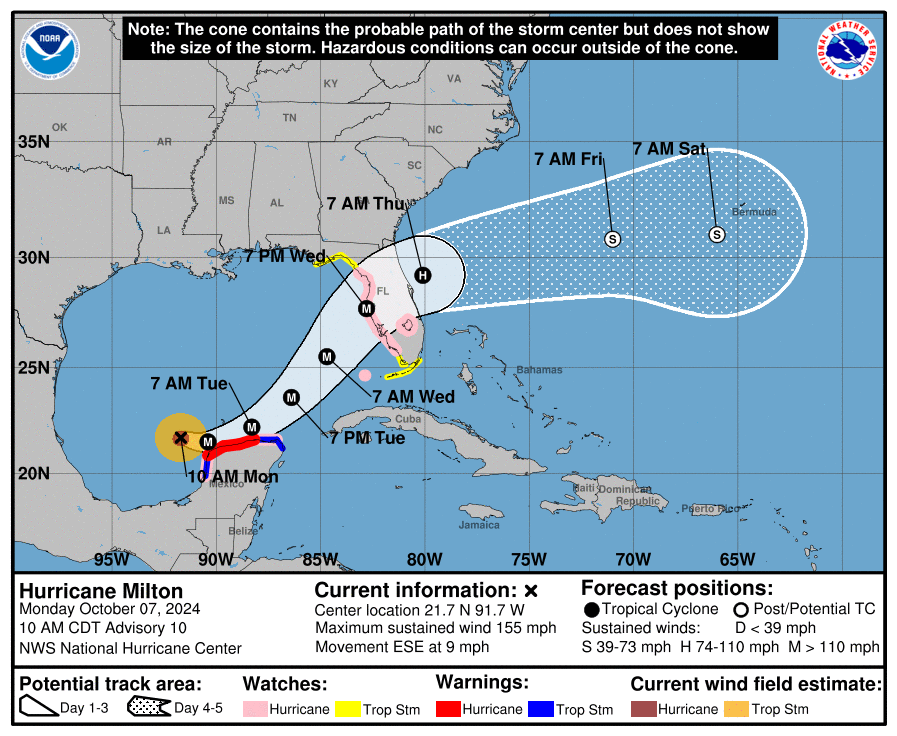The National Hurricane Center (NHC) has confirmed that Hurricane Milton intensified to a Category 5 hurricane as of Monday just before noon Eastern time.
Category 5 is the strongest hurricane based on the Saffir-Simpson Scale, which ranks storms based on windspeeds. A Category 5 hurricane is classified as a hurricane with windspeeds of 157 miles-per-hour (MPH) or greater. The rapidly intensifying storm has continued to strengthen, with maximum sustained windspeeds topping out at 160 mph with the most recent measurements.
Milton has exhibited rapid intensification, which means an increase in maximum sustained winds of at least 30 knots, or roughly 35 mph, in a 24-hour period, a NHC spokesperson told Newsweek. On Sunday night, Milton’s windspeeds were only 90 mph, meaning the storm’s windspeeds have jumped by 70 mph in approximately 12 hours.
More From Newsweek Vault: 5 Steps to Build an Emergency Fund Today
Milton is heading straight for Florida, with meteorologists anticipating the storm making landfall in Tampa Bay on Wednesday. The storm is forecast to cut across the Florida Peninsula before exiting the state’s eastern coast by Thursday.
In addition to strong winds, Milton will bring life-threatening storm surge and widespread amounts of heavy rain to the Florida peninsula later this week. Some other states, including Georgia and South Carolina, are expecting indirect impacts from the storm, including strong winds and rain.
National Hurricane Center
“There is an increasing risk of life-threatening storm surge and damaging winds for portions of the west coast of the Florida Peninsula beginning Tuesday night or early Wednesday,” the NHC update said. “Storm Surge and Hurricane Watches are now in effect for portions of the west coast of the Florida Peninsula and residents in that area should follow any advice given by local officials and evacuate if told to do so.”
More From Newsweek Vault: Learn More About the Different Types of Savings Accounts
A Category 5 hurricane means that “catastrophic damage will occur,” according to the NHC.
“A high percentage of framed homes will be destroyed, with total roof failure and wall collapse,” the NHC said on its website. “Fallen trees and power poles will isolate residential areas. Power outages will last for weeks to possibly months. Most of the area will be uninhabitable for weeks or months.”
More From Newsweek Vault: What Is an Emergency Fund?
Milton is the 13th named storm of the 2024 Atlantic hurricane season, although it is not the first to intensify into a Category 5. Earlier this summer, Hurricane Beryl became a Category 5 hurricane that lashed the southeast Caribbean. Milton also comes twoweeks after Hurricane Helene wreaked havoc in the United States, with areas still recovering from the storm.
Hundreds of thousands of people remain without power from Helene, but National Weather Service (NWS) meteorologist Jason Hess previously told Newsweek that Milton’s impacts were going to be more coastal, whereas Helene’s were further inland for states like Georgia, South Carolina and North Carolina. This means the areas hardest hit by Helene will most likely be missed by Milton.
A hurricane local statement is in place for southeastern Alabama and southern Georgia. More tropical storm- or hurricane-related weather alerts will likely be issued for the region as Milton draws closer.
Update 12:30 p.m. ET 10/7/24: This article was updated with additional information.

